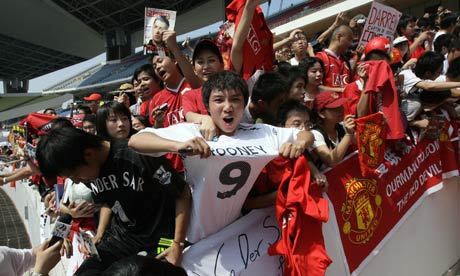The Reds Invade China
Manchester United has been increasing efforts to connect with their some 70 million supporters in China. The last weekend of October, ManU’s “Champions Experience” opened in Beijing after previously being in Shanghai; on Friday alone the experience had over 2,000 visitors. The experience, which was located in front of the “Bird’s Nest” Stadium from the 2008 Olympics, took fans through the history of each of the Club’s 19 League Titles and showcased other memorabilia. Some of the pieces include the first ever league medal won by Man United, shirts worn by Denis Law, Teddy Sheringham, and Ruud van Nistelrooy, as well as cleats worn by Wayne Rooney and David Beckham. However, one of the coolest things in the experience is the final piece, an Epson 3D projection showcase of United’s star players. Also in Beijing was the Barclay’s Premier League Trophy tour, which gave the fans more interactive displays and ways to connect with the teams. As if all of this wasn’t enough for the fans, there were giveaways all weekend and chances to win a signed United shirt.


Even more recently, the Reds have launched a Mandarin version of their official online store, “United Direct”, in order to meet the demands of the growing Chinese fan base. Lifting this language barrier will make it easier for the fans to buy the United kits, personalized shirts or ones with their favorite player’s name on the back. The store also brings an online channel for the fans to order Nike football cleats that can be embroidered with the Red Devil emblem. In addition the store offers Nike training and fashion equipment, football equipment, gifts, souvenirs, and more. The store also added additional payment methods including Alipay, ChinaPay, PayEase, and TenPay to make it easier for the Chinese fans to buy directly from the online store.
What do you think the Next step for Manchester United in China is?
Sources:http://www.manutd.com/en/News-And-Features/Club-News/2011/Oct/Champions-come-to-Beijing.aspx
http://www.manutd.com/en/News-And-Features/Club-News/2011/Nov/manchester-united-online-store-launched-in-mandarin-chinese.aspx
